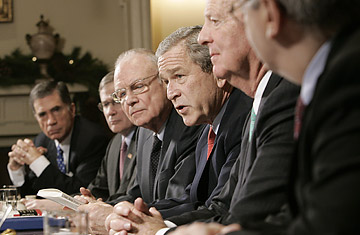
President Bush, center, speaks to members of the media following his meeting with the Iraq Study Group in the Cabinet Room of the White House in Washington, Wednesday, Dec. 6, 2006.
But many Iraqis will be alarmed by the ISG's proposal to change the mission of U.S. troops in Iraq, essentially turning them into detached observers. Few people outside Baghdad's highly fortified Green Zone believe that Iraqi security forces are anywhere near ready to take over the primary security responsibility from the U.S. troops. They point to the utter failure of a massive security operation to stanch the sectarian bloodletting in the Iraqi capital — despite the presence of over 40,000 Iraqi soldiers (and 7,200 U.S. troops), the violence has grown substantially worse.
Far from being part of the solution, the Iraqi military and police forces are often part of the problem. The police, in particular, are thoroughly infiltrated by Shi'ite militias and are frequently complicit in the kidnapping and murder of Sunnis and the ethnic cleansing of mixed neighborhoods. If the U.S. mission in Iraq is, indeed, redefined along the lines suggested by the ISG, things are more likely to get worse than better.
Even so, talk of transferring responsibility to Iraqis and paving the way for a U.S. withdrawal will be welcomed by some Iraqis — those who stand to gain, whether in political terms or purely for propaganda. Prime Minister Nouri al-Maliki, reduced to an isolated, fringe figure with little control of his unraveling country, has been talking up Iraqi control of the security operations in a desperate attempt to appear tough and decisive. Last week, he claimed his forces would be ready to take over as soon as next spring. If the Bush Administration were to take the ISG's suggestion that the Iraqi government be forced to show that "it deserves continued support," it won't help Iraq's cause that its Prime Minister often seems in a state of denial.
Shi'ite politicians such as radical cleric Moqtada al-Sadr and President Bush's recent visitor, Abdel-Aziz al-Hakim, are also keen to see the Americans back off. With U.S. forces no longer in charge, there will be no restraining the Shi'ite militias — including those controlled by al-Sadr and al-Hakim — from bullying and butchering the Sunni minority. In Washington, al-Hakim was careful to emphasize he doesn't want Americans to leave. But Shi'ite leaders want the U.S. to focus on defeating the Sunni insurgency, not on the Shi'ite militias.
Ironically, the other group likely to welcome the ISG report is al-Qaeda in Iraq. The terrorist organization would like nothing better than to see the back of the Americans so they can claim "victory" in their jihad — and then concentrate on slaughtering Shi'ites.
For Iraqis caught between the extremes, however, the report will simply add to the sense of impending doom.
